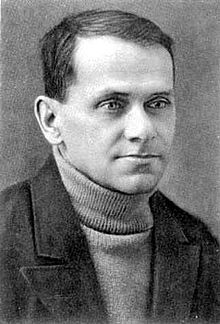Pavel Petrovich Blonsky
Pavel Petrovich Blonski (born May 14 . Jul / 26. May 1884 greg. In Kiev , Russian Empire ; † 15. February 1941 in Moscow , Soviet Union ) was a Soviet psychologist , who in until 1918 Ukraine lived.
life and work
From 1902 to 1907 he studied education and psychology at the St. Vladimir University in Kiev. He became a member of the Social Revolutionary Party , imprisoned several times in 1903, 1905 and 1906. Then he worked as a teacher of pedagogy and psychology at middle schools for women and at the teacher training college in Moscow. In 1913 a master's degree (comparable to a habilitation) for psychology and philosophy followed, and he became a private lecturer at the Moscow State University . In 1918 he became professor of psychology and philosophy there.
He was one of the central school reformers under Lenin in revolutionary Russia. His book Die Arbeitsschule (1919) was supposed to provide the pedagogical basis for the new unified school . The “technically perfect society” is synonymous with the “socially perfect society” and “the culture of the future is an industrial-collectivist culture”. From 1919 to 1931 he was a lecturer and professor at the Academy for Communist Education . In 1923 a reader was published for pupils in rural schools: Rote Morgenröte , followed in 1925 by his main work on Pedology , against which the Communist Party voted firmly in 1936. From 1930 to 1940 he headed the Laboratory for Memory - later Laboratory for Thought and Language.
Blonski favored polytechnical education as the basis for special vocational training that began later. This brought him into opposition to the trade unions and the Komsomol , who preferred to shorten their school days.
He also introduced the behaviorist approach to Russian psychology. In the 1930s, he was heavily criticized for adhering to psychological tests and studies of innate abilities. He contradicted the genetic skeptic Aron Salkind from a genetic point of view.
He is alluded to in Libuse Monikova's novel Treibeis (2016) .
Fonts
- The work school. Edited by Horst E. Wittig, Paderborn 1973 ISBN 978-3506783653 (first Berlin 1921, in the GDR Berlin 1986 ISBN 9783062127229 )
- Pedology . A textbook for the pedagogical colleges , (1925) Moscow 1934
- Memory and Thinking , 1935
literature
- Horst E. Wittig: Life and work of the early Soviet reform pedagogue Pavel P. Blonskij , 1989 https://www.fachportal-paedagogik.de/literatur/vollvergleich.html?FId=87384#vollsehen
Web links
- Literature by and about Pawel Petrowitsch Blonski in the catalog of the German National Library
- http://www.paed.com/reformpaedagogik/index.php?action=blonskij
Single receipts
- ↑ Entry on Блонський Павло Петрович in the Encyclopedia of Modern Ukraine ; accessed on August 1, 2020 (Ukrainian)
- ↑ Marc Depaepe: For the good of the child ?: Pedology, educational psychology and experimental pedagogy in Europe and the USA, 1890-1940 . Leuven University Press, 1993, ISBN 978-3-89271-438-5 ( google.de [accessed August 1, 2020]).
- ^ RA Fando: The beginnings of eugenics in Russia: cognitive and socio-cultural aspects . Logos Verlag Berlin GmbH, 2014, ISBN 978-3-8325-3738-8 ( google.de [accessed on August 1, 2020]).
- ^ Libuse Moníková: Treibeis: Roman . Carl Hanser Verlag GmbH & Company KG, 2016, ISBN 978-3-446-25242-4 ( google.de [accessed on August 1, 2020]).
| personal data | |
|---|---|
| SURNAME | Blonsky, Pavel Petrovich |
| ALTERNATIVE NAMES | Blonsky, PP; Blonski, PP; Blonsky, Pavel Petrovich |
| BRIEF DESCRIPTION | Soviet educator |
| DATE OF BIRTH | May 26, 1884 |
| PLACE OF BIRTH | Kiev , Russian Empire |
| DATE OF DEATH | February 15, 1941 |
| Place of death | Moscow , Soviet Union |
